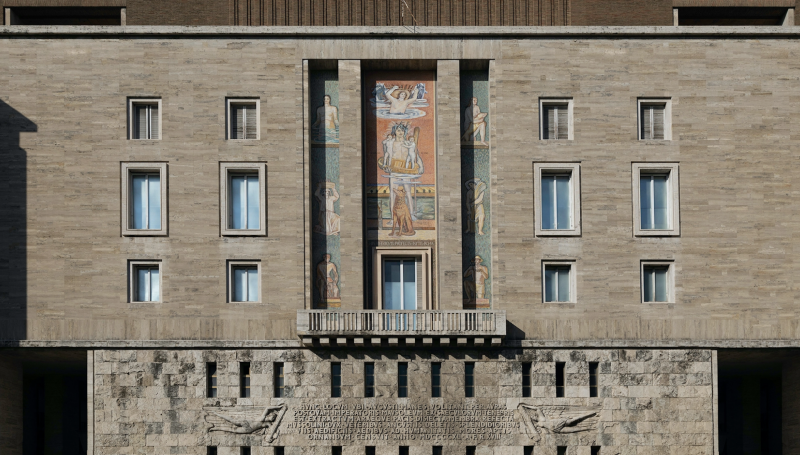New luxury hotels give Rome an upscale shine
Rome’s new wave of five-star hotels will bring investment, jobs and high-end luxury to the Italian capital.
With its tropical resorts and soothing spas, the Bangkok-based hotel brand six senses has made a name for itself by providing affluent customers with some distinct needs of the modern age: tranquility, well-being and, for what it’s worth, a sense of sustainability.
It would be hard to guess then that the brand would choose Rome – a city usually on the fringes of urban and ecological rupture – for its next big European adventure. But next spring, the Six Senses opens its doors in the city, taking over the former headquarters of what was once the Bank of Rome in Piazza S. Marcello, off Via del Corso.
This is an ambitious launch, consisting of a 96-room hotel; a food court on the ground floor, serving Roman and health-oriented classics; a 700 m² roof terrace: and even a botanical garden. With its clean, creamy design, organic textiles and recycled wood elements, the hotel aims to be a cocoon of serenity amidst the hustle and bustle of central Rome.
Six Senses is just one of many five-star hotels that will open in the city over the next two years. There are at least seven new venues coming to the capital: from Nobu reviving the long-lost glamor of Via Veneto, to the Four Seasons in Piazza S. Silvestro. According to Il Messaggero newspaper, these hotels could create up to 4,000 new jobs.
The openings not only mark the change of fortune of Rome’s beleaguered tourist sector, but they are also meant to give the city a contemporary, upscale shine.
Francesca Tozzi, General Manager of Six Senses Rome, is optimistic: “My hope is that Rome will finally become a cosmopolitan city, which can be enjoyed not only for its wonderful culture but also as a meeting place… a place more international than it never has been. been before.”
The five-star boom is taking hold as Rome prepares to host a number of key events, which are expected to draw millions of visitors to the city: the Ryder Cup, a biennial golf competition between teams from Europe and the United States, will be held in the city next September; in 2025, Rome will welcome the Catholic Church Jubilee yearand there is still hope of winning the tender for the World Expo in 2030.
These events could be transformative, boosting the city’s infrastructure and international profile, as well as the revenue of the hospitality sector. The question is whether Rome will be able to recapture it in time. It seems the new hotels are eager to help.
On the northern edge of the historic town centre, the fashion house Bulgari is transforming a public ministry from the Mussolini era into a his first hotel in the capital. The site is an impressive structure of travertine marble and Roman brick with a fascist sense of scale. It overlooks two of the city’s most emblematic monuments, the Ara Pacis and Mausoleum of Augustus.
The Bulgari brand has donated thousands of euros to help restore Rome’s landmarks, including a €120,000 investment in the The new lighting system of the Ara Pacis museum. It has also financed several major restorations in the capital, from the Spanish Steps to the archaeological site of Largo di Torre Argentina.
Across town, on Via Veneto, once an artery of culture and the greats, now a symbol of Rome’s languor, luxury chains are breathing new life into Nobu and rosewood. The latter, due to open in 2024, restores the former headquarters of Italy’s Banca Nazionale del Lavoro, to include a lobby bar and cafe and an elegant rooftop terrace.
The reconversion of former bank buildings and public administrative offices is a theme of the new wave of luxury hotels. Historically, Rome, unlike Milano, has failed to attract international brands in part due to a lack of real estate large enough to accommodate them. But the growing availability of vacuum palace offers new opportunities for high-end brands while giving the urban landscape a modern and shiny rehabilitation.
Back on Via del Corso, the Six Senses also plans to play its part in supporting the city’s urban renewal: in part, by promoting sustainability, as well as education and awareness around the subject. Commendably, for example, the hotel is aiming to eliminate single-use plastics, such as bottles, in rooms, and to ban polyester in staff uniforms. It has also set up an “Earth Lab” which will host seminars for guests and locals on environmental topics.
A portion of the hotel’s revenue will be dedicated to impactful projects in the neighborhood, starting with cleaning the facade of the adjacent church, Chiesa di S. Marcello al Corso. “We want to show what is possible, even if it makes life difficult for us,” says Tozzi.
Recently, Six Senses installed a large food composter in the basement of the hotel capable of processing 70 kg of waste per day. “We’re going to ‘compete’ with AMA,” Tozzi said wryly, referring to Rome’s famous household waste collection agency.
by Charles Seymour
Ph: wonderland magazine. com


Comments are closed.